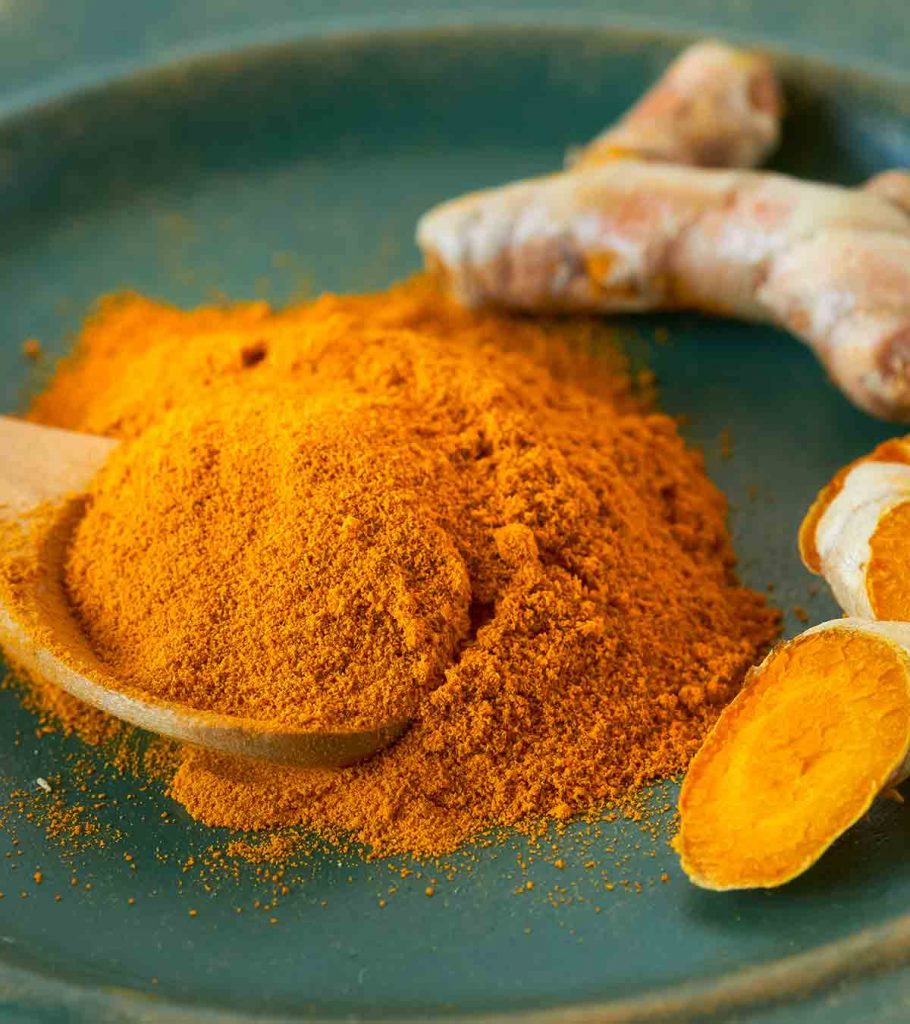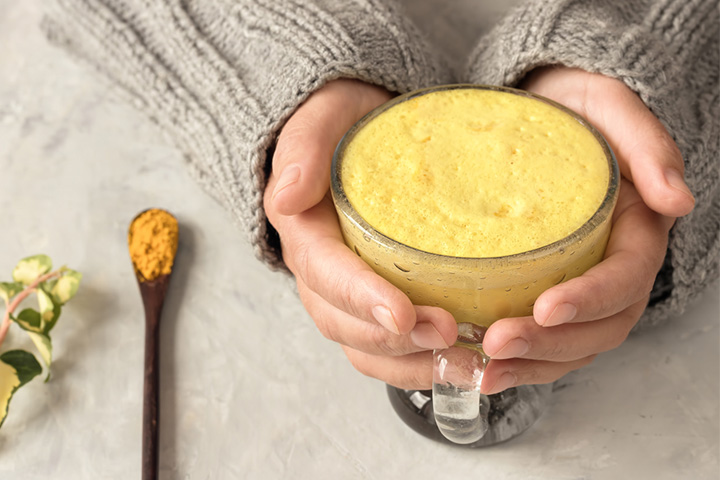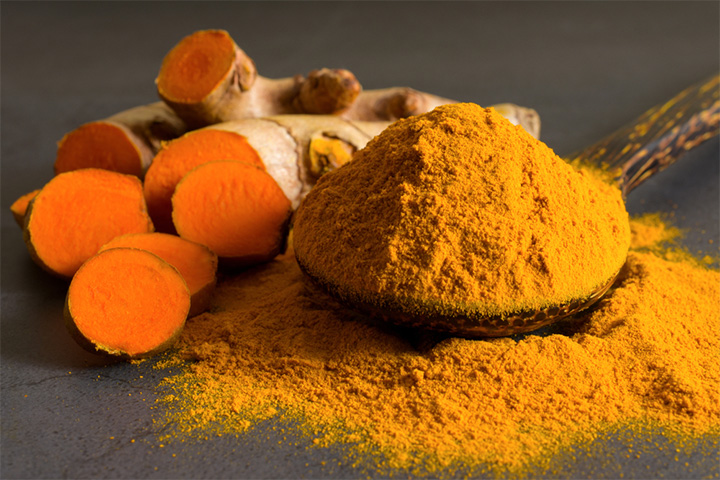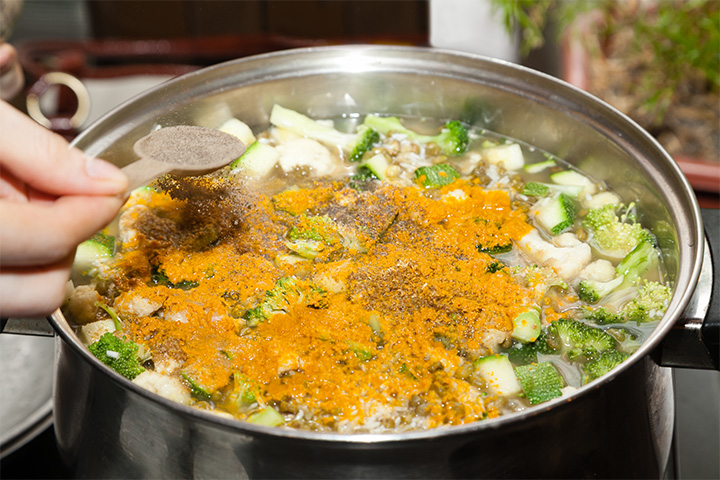Turmeric is a common spice derived from the Curcuma longa plant native to South Asia (1). It is used in traditional medicine to promote postpartum recovery and boost milk production. However, you might want to know if it is safe to consume turmeric during breastfeeding.
Turmeric is rich in curcuminoidsiXThese are phenolic compounds added to foods as a therapeutic additive that help in conditions such as inflammation and anxiety and are also used as pigment and spice., especially curcumin, which possess therapeutic and medicinal properties (2). These bioactive compounds have health-promoting effects, but no data supports turmeric’s use to enhance breast milk production and supply. Hence, using turmeric for lactation-related purposes must be done only after consulting an expert.
Read on as we tell you all about the safety of turmeric when breastfeeding, its possible health benefits and side effects, and ways to include turmeric in your diet.
Is It Safe To Consume Turmeric During Breastfeeding?
Yes, turmeric can be used while breastfeeding. The U.S. Food and Drug Administration considers turmeric as “generally recognized as safe” (GRAS) as a food ingredient (3).
In some cultures, turmeric is considered a galactagogueiXIt can be any food believed to boost the milk supply in humans and other animals. For example, fenugreek, milk thistle, and leafy greens., an ingredient that increases breast milk production in nursing mothers. However, there is no scientific evidence that supports the use of turmeric as a galactagogue (4). There is also no data to suggest the safe intake limit of turmeric when breastfeeding. Therefore, it is good to consume turmeric only as a flavoring agent in foods. If you wish to consume turmeric or a turmeric-containing nutritional supplement for lactation-related purposes, then you may consult a lactation specialist.
Nutritional Value Of Turmeric
Turmeric contains vital micronutrients and bioactive compounds such as curcumin that are essential for the maintenance of overall maternal and infant health (1). It is good to add turmeric in controlled amounts in your daily diet.
The following table contains the approximate composition of one tablespoon, i.e., one serving of turmeric powder, and the recommended amount of each nutrient per day (RDA).
| Name | Amount | RDA |
|---|---|---|
| Fiber, total dietary | 2.13g | – |
| Calcium, Ca | 15.8mg | 1,300mg |
| Iron, Fe | 5.17mg | 10mg |
| Magnesium, Mg | 19.6mg | 360mg |
| Phosphorus, P | 28.1mg | 1,250mg |
| Potassium, K | 196mg | 2,500mg (AI) |
| Sodium, Na | 2.54mg | 1,500mg (AI) |
| Manganese, Mn | 1.86mg | 2.6mg (AI) |
| Folate, total | 1.88µg | 500μg |
| Choline, total | 4.62mg | 550mg (AI) |
AI = Adequate intake (AI) is the recommended average daily intake level of apparently healthy people. It is used when an RDA cannot be determined (5).
Sources: U.S. Department of Agriculture (6) and Oregon State University (7)
Besides the nutrients mentioned above, turmeric is also considered as a good source of the omega-3 fatty acid,linolenic acidiXIt is an omega-3 essential fatty acid, available in foods such as flaxseeds, walnuts, chia, and vegetable oils, and used to treat heart and blood vessel disorders., and certain bioactive compounds. All these components give turmeric the potential to provide some health benefits that are worth a check.
Health Benefits Of Turmeric While Breastfeeding
There are several suggested maternal health benefits of turmeric. However, not all of them are backed by scientific evidence. Below is a list of scientifically-backed health benefits of turmeric.
1. Immunity: Curcumin is the yellow-orange bioactive compound found in turmeric. The substance has long been associated with medicinal properties that help strengthen the immune system and fight mild infections, like sore throat (8). Curcumin’s true potential has now been realized by modern medicine. Various studies show that curcumin has immunomodulatoryiXIt refers to a substance that can modulate or suppress the immune system and control and fight diseases such as infection and cancer., anti-proliferative, and antimicrobial properties that could support the treatment of chronic diseases and mild infections (9). Turmeric also contains other valuable nutrients that can help boost immunity.
2. Digestive health: Studies show that curcumin holds pharmacological properties that could prove useful in treating various digestive disorders. Some of the common digestive issues that women face postpartum are constipation, flatulence, and gastric refluxiXIt is a condition where stomach acid flows back into the esophagus (food pipe), causing chest pain.. For all these digestive concerns, turmeric has proven its possible effectiveness (10) (11). In fact, some studies have found that the use of turmeric can potentially protect the GI system through its anti-inflammatory effects (12).
3. Mental health: Postpartum depression can occur due to a combination of mental and physical factors (13). Research in the field of psychoneuroimmunology (PNI) reveals that depression is associated with inflammation. Thus, PNI suggests the use of anti-inflammatory products that could help reduce inflammation. Turmeric has strong anti-inflammatory properties that could prove useful in enhancing your mood and helping fight postpartum depression (14) (15). Curcumin increases DHA in the brain and helps reduce anxiety (16).
4. Inflammation: Some women experience joint and back pains after pregnancy. One of the reasons is inflammation and is most commonly known as inflammatory arthritisiXA condition of joint pain and inflammation that reduces motion and increases stiffness. (17). Curcumin has a strong anti-inflammatory activity, which could provide symptomatic relief from joint and back pains (18).
5. Antioxidant effects: Curcumin is characterized by its high antioxidant activity, which is comparable to vitamin C and is more than ten times higher than the activity of the vitamin E. The strong antioxidant profile of the compound could help mitigate the effects of oxidative damage on the body (10).
6. Cholesterol management: The levels of cholesterol and triglyceridesiXThese are the most common type of fats in the body. The calories obtained from butter, oil, and other fats are converted into triglycerides and stored in the fat cells to be later used as energy. increase during pregnancy as they are crucial for the growth and development of the fetus and the production of hormones (19). These lipid levels decrease postpartum. However, sometimes the cholesterol levels do not go back to normal, leading to health problems. Turmeric is often used in Ayurveda as one of the potent natural remedies to regulate cholesterol levels. A research study demonstrated that turmeric extract could help reduce the synthesis of cholesterol and triglycerides (20) (21).
7. General benefits: Curcuminoids in turmeric possess antioxidant, analgesic, anti-inflammatory, antiseptic, anticarcinogenic, chemopreventive, antiviral, antibacterial, antifungal, and antiplateletiXIt is a class of medication that prevents platelet aggregation, preventing blood clots. activity (22). Thus, daily intake of turmeric with a regular diet can help in the long run.
Turmeric is a healthy addition to your diet. However, its effectiveness can only be assured when it is selected and stored right. If you have been using turmeric before pregnancy and during, then you can continue to do so. Do not add a new element just because you are breastfeeding.
Selection And Storage Of Turmeric
Turmeric is available in two forms – dried rhizome and turmeric powder. There are some other products like essential oil, curry powder, and oleoresins that are derived from either of these forms (23). You can purchase any of these products as per your preference and requirement. But while you purchase, make sure that you buy good quality or organic products from a reputable store.
Out of the various turmeric types available worldwide, Indian turmeric is considered the best due to its high quality and dense constitution of important bioactive compounds.
Once purchased, turmeric should be stored in an airtight container and away from direct sunlight. This is crucial as turmeric contains curcuminoids, the color constituents of turmeric that deteriorate with light. This impacts not only the color but also certain pharmacological properties.
Ways To Add Tumeric In The Diet
Turmeric, along with other spices, can be added to several dishes, including milk, soups, salads, and curries. You can also use turmeric as one of the ingredients to tenderize meat. It can also be added to canned broths and pickles as a preservative.
However, the quantity must be kept in control as the flavor of the spice could be overpowering.
Turmeric is usually considered to be safe for consumption during breastfeeding. Turmeric is known to have several health benefits, such as improved immunity, better digestion, improved mood, anti-inflammatory effects, and cholesterol management. In some cultures, turmeric is considered to be a galactagogue. However, you should consult a nutritionist or gynecologist about the permissible daily amount of turmeric you can consume. Further, while it is safe to add small amounts of turmeric to your diet, check with your doctor before taking any turmeric supplements.
Key Pointers
- Turmeric is a good source of omega-3 fatty acid and bioactive compounds.
- The use of turmeric as a galactagogue is not scientifically proven.
- Consumption of turmeric helps boost immunity, reduces inflammation, and manages cholesterol.
- It is advised to store turmeric away from the sunlight to avoid deterioration of its pharmacological properties.
- To use turmeric during breastfeeding You can add turmeric to salads, curries, and milk.















